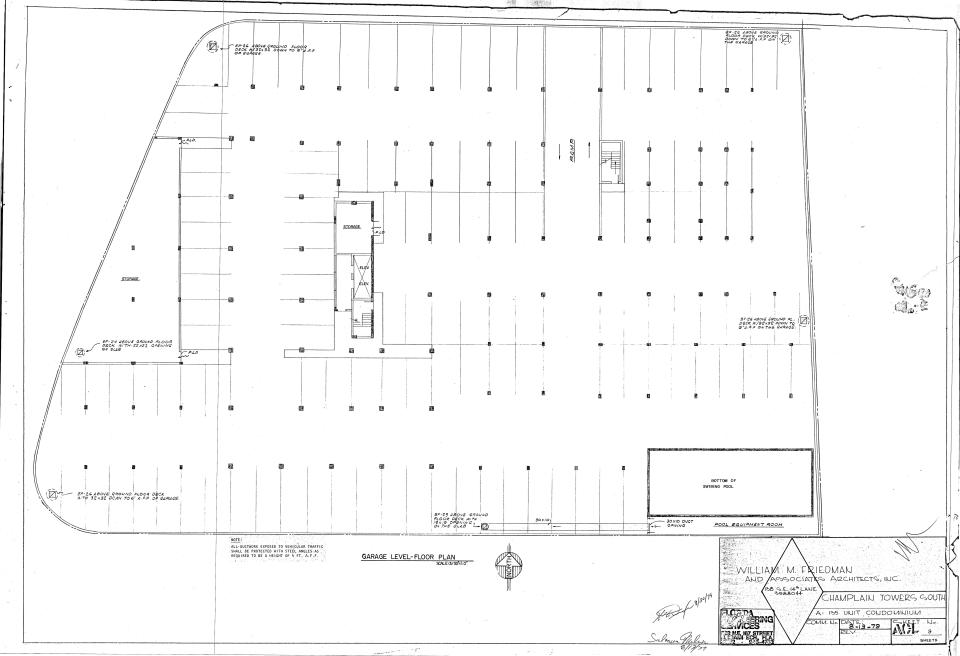'Save lives, not just money': Surfside collapse grand jury report calls for reforms, warns of further troubles
- Oops!Something went wrong.Please try again later.
MIAMI – A Miami-Dade County grand jury charged with looking into the deadly Florida building collapse said the state must pass sweeping reforms to avoid similar tragedies.
Among the recommendations included in the 43-page report:
A county ordinance requiring the recertification of buildings every 10 to 15 years instead of every 40 years, which should be extended statewide.
Mandating periodic inspections before recertification inspections are accepted.
Removing a provision of the Florida Condominium Act that allows condo boards to waive their obligation to fund reserves for building repairs.
The report came almost six months after the 12-story, 136-unit Champlain Towers South building collapsed in Surfside, Florida, killing 98 people and sending shockwaves around the world.
The grand jury's findings are the first to be released amid a patchwork of federal, local and privately led investigations looking to determine what led to the building's demise. Grand juries in Miami-Dade are used for more than criminal indictments, also exploring broader issues of public health and safety.
"There are a lot of reforms here that will unequivocally save lives, not just money," Miami-Dade State Attorney Katherine Fernandez Rundle said in a phone interview.
The inquiry raises red flags about whether any of Florida’s condo buildings – the largest building stock in the nation – could face a similar fate and whether statewide regulations exist to safeguard against it.
“If we do not build safely, if we do not immediately institute suggested improvements to the policies and procedures ... we predict that the Chaplain Tower South Condominium building will not be the last partial building collapse in our community,” the report stated.
The report pointed to lapses by the condo board to make timely repairs due to lack of reserves and criticized the Florida Condominium Act for allowing a condo board to waive its obligation to fund reserves for repairs.
Abieyuwa Aghayere, a professor of structural engineering at Drexel University in Philadelphia who reviewed the building’s original design plans for USA TODAY, applauded the report's recommendation to shorten the recertification period from 40 years to 10-15 years, something he pointed out in the wake of the collapse.
"Given that building codes change about every three to six years, the 15-year recommendation by the grand jury seems reasonable to me," he said. "It will enable problems to be caught on time before they become major issues that would cost enormous amounts of money to fix – as was the case in Surfside."
Fernandez Rundle said her office is waiting until the National Institute of Standards and Technology, the federal agency tasked with investigating the collapse, has concluded their investigation before announcing whether criminal charges could be filed.
Miami-Dade County's top prosecutor said lawmakers had the unprecedented opportunity to turn many of these civil infractions into criminal offenses.
“This would put condo owners, board associations and everyone on notice that if you fail to do the simplest things; hold honest elections, keep minutes, turn over engineering reports it’s potentially a crime and investigators are going to come looking,” Fernandez Rundle said.
It's not the first time the office has asked a grand jury to investigate condo associations and boards.
In February 2017, a Miami-Dade County grand jury issued recommendations on condominium records and financial and election misconduct, including a provision prohibiting associations from employing or contracting service providers owned or operated by a board member. The measures were adopted by the Florida Legislature and signed into law.
Mary Ann Ruiz, a Miami-area condominium attorney who represents mostly individual owners, said she expects the grand jury report to spur Florida lawmakers into action and advocate for changes to state regulations.
"This report arrives just in time," Ruiz said. "The tragic events in Surfside show us that an overhaul of Florida condominium laws is long overdue."

Though building codes in Florida are among the strictest in the nation, safeguards have focused on the construction of new buildings as opposed to the condition of existing structures. After developers conclude construction, maintenance and repairs fall squarely on condo association boards.
Except for a brief two-year period, the state has had no oversight mechanism to regulate repairs or maintenance of condos in nearly 60 years. The Sunshine State does not mandate post-construction inspections nor have enforcement measures should contingencies arise when unsafe buildings are identified.
Florida law allows condo associations – often saddled with having to shore up millions of dollars in repair costs – to defer paying for maintenance costs.
Such was the case of Champlain Towers South, which had about $706,000 in its cash reserves. A 2018 report by Morabito Consultants, a structural engineering firm based in Maryland, put the bill for maintenance at the $15 million mark.
Though the cause of the building collapse is unknown, a cache of documents provided to USA TODAY in July revealed a slew of irregularities ranging from flaws in the original design and structural issues in disrepair.
In 2008, the state Legislature passed a law that would require condo associations to inspect their buildings every five years and provide a plan to deal with repairs. This is known as a "reserve study."
The measure was repealed in 2010.
Recertification requirements are absent around the state.
Only two counties in Florida, Miami-Dade and Broward, require buildings to be recertified after the 40-year mark. Municipalities in both counties mandate that condo associations or owners hire engineers to verify the structural integrity of the property.
The measure came into effect after another Florida tragedy: In 1974, a federal office building that housed the Drug Enforcement Administration's Miami field office collapsed, killing seven employees and injuring 15 others.

This article originally appeared on USA TODAY: Grand jury probe into Surfside condo collapse, condo safety released

